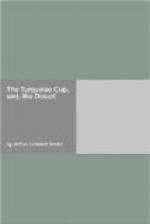Suddenly, from the minaret of the mosque came the cry of the mueddin. The clamor of the market ceased and the Mussulmans fell upon their knees, facing the east and Mecca. The camels were already kneeling, but they were facing the north and Biskra.
While the faithful were praying, the unbelievers from the Soudan fell back and stood silent. A cry to God, no matter what god, silences the patter of the market-place. Abdullah prayed as a child beseeches his father.
“Give me, Allah, a safe and quick journey. Unchoke the wells at Okba. Strengthen the yellow camel. Make high the price of dates and low the price of hides; ’tis thus I have ventured. Bring us in safety to Biskra. And bring me to the damsel who sits behind the green lattice. These things I pray—thy sinful son, Abdullah.”
He rose, and the old man stood at his elbow. Abdullah had forgotten his passengers.
“This,” said the old man, turning to a woman veiled to her eyes, “is my daughter, and this,” he added, “is her maid,” and a negress, comely and smiling, made salaam. “I pray thee,” he continued, “to deliver this invoice,” and he handed Abdullah a paper.
Abdullah was too busy to notice his passengers. “Let them mount at once,” he said, slipping the paper under his girdle, and he left them to Ali, who came up showing his white teeth.
There were the last words, instructions, cautions, adieus, and then Abdullah held up his hand. Ali gave the cry of the camel-driver and the uncouth beasts, twisting and snarling under their loads, struggled to their feet.
Another cry, and they began their voyage. They traversed the square, passed the mosque, turned down a narrow street, and in five minutes crossed the line that bounded the oasis, and entered upon the desert.
Immediately the dun leader took his place at the left and slightly in advance. The fourth on the right of the dun was the black racer. He carried two water-skins and Abdullah’s saddle. Then came, in ranks, fifteen camels, Ali riding in the centre. On the right flank rode the two women, with enormous red and white cotton sunshades stretched behind them. Then, at an interval of six rods, came fifteen camels unattended. They simply followed the squad in front. The dun leader and the black racer had lanyards about their necks. The other camels had no harness save the surcingles that held their loads.
In a panic, a sand-storm, a fusillade from Bedouins, a mirage, and a race for water, if Abdullah and Ali could grasp these lanyards, the caravan was saved, since the other camels followed the dun leader and the black racer as sheep follow the bell-wether.
Abdullah walked at the left, abreast of the dun. At intervals he rode the black racer.
The pace of a caravan is two miles an hour, but Abdullah’s, the two cripples included, could make two miles and a quarter. The black racer could make sixty miles a day for five days, without drinking, but at the end of such a journey his hump would be no larger than a pincushion, and his temper—?




